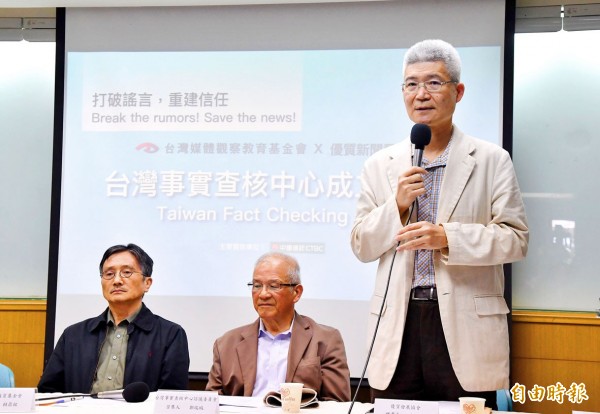《TAIPEI TIMES》 Taiwan Fact Checking Center to open in July

Quality News Development Association chairman Hu Yuan-hui yesterday speaks at a news conference in Taipei attended by Media Watch Foundation chair Lai Ting-ming, left, and former minister of education Cheng Jei-cheng, center. Photo: CNA
COMBATTING FAKE NEWS: CTBC Bank has provided initial funding for the center, but organizers said the organization must raise NT$2 million more on its own
By Shelley Shan/Staff reporter
The nation’s first fact-checking center was established yesterday to tackle the spread of fake news on social media.
The Taiwan Fact Checking Center (台灣事實查核中心), a partnership between the Taiwan Media Watch and the Quality News Development Association, is scheduled to begin operations in July.
The center would fact-check alleged fake news reported by social media users to media platforms or reported directly to it, and would work to verify news of public interest, Quality News Development Association chairman Hu Yuan-hui (胡元輝) said.
“We will adopt a three-stage approach that has been used by many established fact-checking organizations to verify the authenticity of information,” he said.
Four full-time staffers would be hired initially, and each allegation of fake news would be handled by at least three fact-checkers, he said.
Fact-checkers would be required to have relevant education and experience to help them determine the accuracy of the information, and they would also conduct interviews with experts if needed, he said.
After a news item is vetted by one fact-checker, a second fact-checker would review the documents and the information used by the first one and then the third fact-checker would conduct a final review on the words and logic used in the item in question as well as the documents used for verification purposes, he said.
If there are still disputes about veracity, the center would seek assistance from its consultants, Hu said, adding that it could also host experts’ meetings.
Before accepting a case, the center will determine if it has the resources and information to assess the topic, he said.
The center plans to invite Facebook, Google and LINE to assist it in tackling fake news on their platforms, he said.
Facebook cooperates more with non-governmental organizations than Google and LINE do, but at present it only works with the Taiwan Media Watch on media literacy, not fact-checking, Hu said.
Although Facebook has taken action to address fake news in other nations, it has been reluctant to do so in Chinese-speaking countries, Hu said.
Such measures include labeling certain new items as fake news and using algorithms to slow down the transmission of the information labeled as fake news, he said.
“The center does not receive any funding from Facebook” as the firm does not sponsor or provide funding to any fact-checking agency in the world, he said.
“We are not asking Facebook to sponsor the center’s operations. We are only asking it to handle news items on its platform if they are being vetted,” he said.
“We hope that Facebook can work with information specialists in Taiwan so that the technology can be used to tackle fake news as well,” Hu said.
CTBC Bank has provided initial funding, but the center needs to raise NT$2 million (US$68,166) itself.
Facebook remains reluctant to identify itself as a media outlet, saying that it is just a platform, but it has recognized that it must take responsibility for the information circulated on its platform, including fake news, Taiwan Media Watch public affairs director Lin Fu-yueh (林福岳) said.
“Media literacy remains the fundamental solution to the problems caused by fake news,” Lin said.
While Facebook has planned to utilize artificial intelligence to tackle fake news, the technology is not yet mature enough to detect all errors, Lin said.
新聞來源:TAIPEI TIMES




















